This content originally appeared on The Progressive — A voice for peace, social justice, and the common good and was authored by Melania Murphy.
This post was originally published on Radio Free.
This content originally appeared on The Progressive — A voice for peace, social justice, and the common good and was authored by Melania Murphy.
This post was originally published on Radio Free.
This content originally appeared on The Grayzone and was authored by The Grayzone.
This post was originally published on Radio Free.
This content originally appeared on The Real News Network and was authored by The Real News Network.
This post was originally published on Radio Free.
This content originally appeared on The Intercept and was authored by The Intercept.
This post was originally published on Radio Free.
This content originally appeared on VICE News and was authored by VICE News.
This post was originally published on Radio Free.
This content originally appeared on VICE News and was authored by VICE News.
This post was originally published on Radio Free.
Washington D.C., October 17, 2024—CPJ is alarmed by reports that Iranian authorities arrested Iranian-American journalist Reza Valizadeh in September in the capital, Tehran, and have since detained him in Evin prison without access to a lawyer, according to a former colleague, who spoke to CPJ on the condition of anonymity, citing fear of government reprisal.
Some reports indicated Valizadeh was facing charges of collaborating with Persian-language media outlets abroad; CPJ was unable to confirm what charges or potential penalties he faces.
“Iranian authorities must immediately release journalist Reza Valizadeh and drop any charges levied against him,” said Yeganeh Rezaian, CPJ’s interim Middle East and North Africa program coordinator. “Iranian journalists working and living abroad should be free to visit their homeland without fear of prosecution for their profession.”
Valizadeh, a former reporter and news anchor at the United States Congress-funded Persian-language Radio Farda, returned to Iran in February 2024 after 16 years of working as a journalist in the U.S., those sources said. Security agents with the Iranian Intelligence Ministry and the Islamic Republic Guard Corps (IRGC) detained and questioned Valizadeh at the airport before conditionally releasing him.
Valizadeh resigned from Radio Farda in November 2022 and subsequently worked as a freelance journalist with several other Farsi-speaking media outlets in exile, according to the former colleague. Valizadeh previously reported for French broadcaster Radio France and the Persian-language service of the U.S. Congress-funded broadcaster Voice of America.
CPJ’s email to Iran’s mission to the United Nations in New York requesting comment on Valizadeh’s detention did not receive a reply.
This content originally appeared on Committee to Protect Journalists and was authored by CPJ Staff.
This post was originally published on Radio Free.
This content originally appeared on Laura Flanders & Friends and was authored by Laura Flanders & Friends.
This post was originally published on Radio Free.
This content originally appeared on Radio Free Asia and was authored by Radio Free Asia.
This post was originally published on Radio Free.
This content originally appeared on Radio Free Asia and was authored by Radio Free Asia.
This post was originally published on Radio Free.
This content originally appeared on VICE News and was authored by VICE News.
This post was originally published on Radio Free.
This content originally appeared on VICE News and was authored by VICE News.
This post was originally published on Radio Free.
This content originally appeared on The Real News Network and was authored by The Real News Network.
This post was originally published on Radio Free.
This content originally appeared on ProPublica and was authored by ProPublica.
This post was originally published on Radio Free.
The American tragedy of Donald J. Trump is about to come to an end with a popular front that elects the first Black and South Asian woman president of the United States. America is ready, and so is Gaslit Nation, with our historic number of phone banks to ensure we rub MAGA’s nose in their defeat.
The KKK, the Know Nothings, Nazis, MAGA—whatever you want to call them—will always be among us, as hate and ignorance are human nature. What’s important now is that we focus on building our political power, not only to elect Kamala Harris but to ensure that she has the Congress and state governments she needs to bring much-needed reforms to our broken system, especially to our courts. We must commit to holding her accountable as president as well as actively call out the racist and misogynistic attacks from the far-right and the media. Build with your community today, because we’re going to need each other in these critical and exciting years ahead.
In this special episode, Terrell Starr of the Black Diplomats Podcast and Substack, who has interviewed Kamala Harris on a number of occasions, joins Gaslit Nation to discuss why she can win. This week’s bonus show, exclusive to our subscribers at the Truth-teller level and higher, includes questions from our listeners subscribed at the Democracy Defender level and higher, and examines what Kamala Harris’s foreign policy may look like, especially in regard to Ukraine.
Thank you to everyone who supports the show—we could not make Gaslit Nation without you!
Join the conversation with a community of listeners at Patreon.com/Gaslit and get bonus shows, all episodes ad free, submit questions to our regular Q&As, get exclusive invites to live events, and more! Subscribe today at Patreon.com/Gaslit!
Show Notes:
Book Launch Reception for In the Shadow of Stalin: The Story of Mr. Jones – Sept 16
Monday September 16th 7pm at the Ukrainian Institute of America join us for a wine reception and live taping of Gaslit Nation with Terrell Starr for the launch of the graphic novel adaptation of Andrea’s film Mr. Jones! Get in free by subscribing at the Truth-teller level or higher on Patreon!
Indivisible x Gaslit Nation Phonebank Party! — August 15 at 7pm ET
Every third Thursday through election day and on election eve in November we’re calling voters in Republican-hostage states in the Midwest with Indivisible to ensure a Democratic Senate. Sign up here to join us: https://www.mobilize.us/indivisible/event/628701/
Sister District x Gaslit Nation Phonebank Parties! – Every Wednesday in October!
Every Wednesday through October, we’re phone-banking with Sister District, calling voters in Michigan, Wisconsin, Pennsylvania, Arizona, and Georgia. Sign up here to join us: https://www.mobilize.us/sisterdistrictnyc/event/642096/
Terrell Starr of the Blacki Diplomats Podcast & Substack https://terrellstarr.com/
Opening Clip: “Don’t ever carry as a personal burden your capacity to do whatever you dream and aspire to do based on other people’s limited ability to see who can do what. Sometimes people will open the door for you, sometimes they won’t.. and then you need to kick that fucking door down” https://x.com/Acyn/status/1790047553511195053
Clip: “Gov. Andy Beshear (D-KY) on his re-election and vetoing anti-trans bills: “All children are children of God … I was going to stand up for the most marginalized children who didn’t deserve either a state legislature or an entire campaign picking on them.” https://x.com/HeartlandSignal/status/1726806702421610566
Clip: Ashton Pittman: “Flashback 2012: The Obama campaign wasn’t ready to endorse marriage equality. But when asked about it, Joe Biden broke with the campaign’s messaging and endorsed it. An avalanche of Democrats, including President Obama, soon followed him.” https://x.com/ashtonpittman/status/1815132808790020228
Clip: In praise of Joe Biden: https://x.com/maddenifico/status/1815457006083600802
Stephen Miller Meltdown https://x.com/MollyJongFast/status/1815210257330659594
Drake VS Kendrick Explained to White People https://www.youtube.com/watch?v=K3uWj2MpydI&t=1s
Kendrick Lamar/Kamala Harris mash-up https://x.com/tolstoybb/status/1815102526561419439
America Is Ready for a Black Female President—but Not Kamala Harris by Keli Goff https://www.thedailybeast.com/america-is-ready-for-a-black-female-presidentbut-not-kamala-harris?utm_medium=socialflow&utm_source=twitter_owned_tdb&via=twitter_page&utm_campaign=owned_social
This content originally appeared on Gaslit Nation and was authored by Andrea Chalupa.
This post was originally published on Radio Free.
This content originally appeared on Democracy Now! and was authored by Democracy Now!.
This post was originally published on Radio Free.

American historian and the author of White Trash: The 400-Year Untold History of Class in America, Nancy Isenberg, calls Republican vice-presidential nominee J.D. Vance a peddler of the “self-made man myth.” Isenberg criticizes Hilbilly Elegy, the memoir that propelled him to fame, as a deceptive way of selling this myth and the conservative politics it comes with. “Much of what his memoir says tells us nothing about real class conditions,” Isenberg says, pointing to her own historical and sociological research on the rural poor in the United States.
This content originally appeared on Democracy Now! and was authored by Democracy Now!.
This post was originally published on Radio Free.
Standing knee-deep in an emerald expanse, a row of trees offering respite from the sweltering heat, Rosa Morales diligently relocates chipilín, a Central American legume, from one bed of soil to another. The 34-year-old has been coming to the Campesinos’ Garden run by the Farmworker Association of Florida in Apopka for the last six months, taking home a bit of produce each time she visits. The small plot that hugs a soccer field and community center is an increasingly vital source of food to feed her family.
It also makes her think of Guatemala, where she grew up surrounded by plants. “It reminds me of working the earth there,” Morales said in Spanish.
Tending to the peaceful community garden is a far cry from the harvesting Morales does for her livelihood. Ever since moving to the United States 16 years ago, Morales has been a farmworker at local nurseries and farms. She takes seasonal jobs that allow her the flexibility and income to care for her five children, who range from 18 months to 15 years old.
This year, she picked blueberries until the season ended in May, earning $1 for every pound she gathered. On a good day, she earned about two-thirds of the state’s minimum hourly wage of $12. For that, Morales toiled in brutal heat, with little in the way of protection from the sun, pesticides, or herbicides. With scant water available, the risk of dehydration or heat stroke was never far from her mind. But these are the sorts of things she must endure to ensure her family is fed. “I don’t really have many options,” she said.
Now, she’s grappling with rising food prices, a burden that isn’t relieved by state or federal safety nets. Her husband works as a roofer, but as climate change diminishes crop yields and intensifies extreme weather, there’s been less work for the two of them. They have struggled to cover the rent, let alone the family’s ballooning grocery bill. “It’s hard,” she said. “It’s really, really hot … the heat is increasing, but the salaries aren’t.” The Campesinos’ Garden helps fill in the gap between her wages and the cost of food.
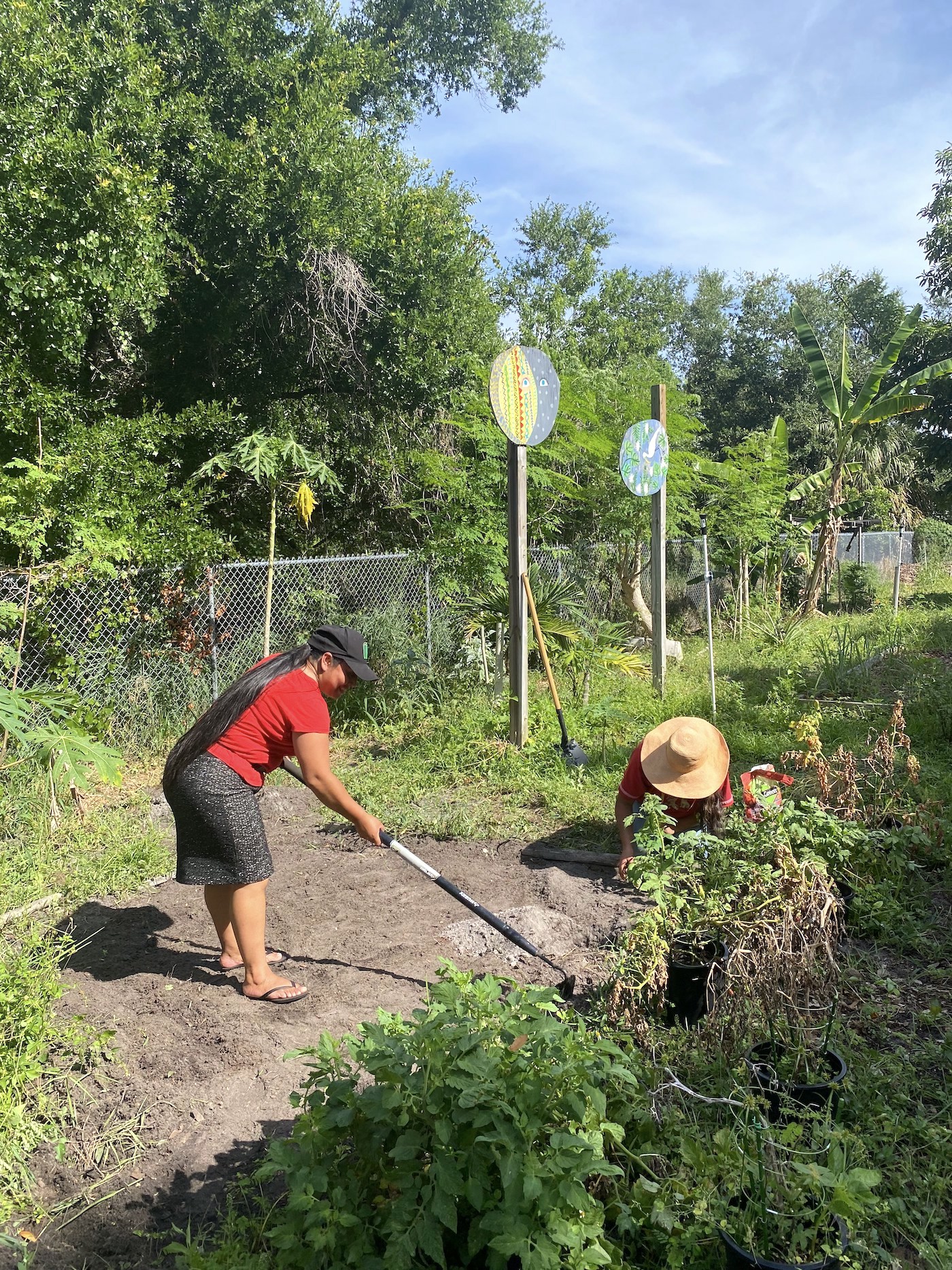
Her story highlights a hidden but mounting crisis: The very people who ensure the rest of the country has food to eat are going hungry. Although no one can say for sure how many farmworkers are food insecure (local studies suggest it ranges from 52 to 82 percent), advocates are sure the number is climbing, driven in no small part by climate change.
The 2.4 million or so farmworkers who are the backbone of America’s agricultural industry earn among the lowest wages in the country. The average American household spends more than $1,000 a month on groceries, an almost unimaginable sum for families bringing home as little as $20,000 a year, especially when food prices have jumped more than 25 percent since 2019. Grappling with these escalating costs is not a challenge limited to farmworkers, of course — the Department of Agriculture says getting enough to eat is a financial struggle for more than 44 million people. But farmworkers are particularly vulnerable because they are largely invisible in the American political system.
“When we talk about supply chains and food prices going up, we are not thinking about the people who are producing that food, or getting it off the fields and onto our plates,” said Nezahualcoyotl Xiuhtecutli.
Xiuhtecutli works with the National Sustainable Agriculture Coalition to protect farmworkers from the occupational risks and exploitation they face. Few people beyond the workers themselves recognize that hunger is a problem for the community, he said — or that it’s exacerbated by climate change. The diminished yields that can follow periods of extreme heat and the disruptions caused by floods, hurricanes, and the like inevitably lead to less work, further exacerbating the crisis.
There isn’t a lot of aid available, either. Enrolling in federal assistance programs is out of the question for the roughly 40 percent of farmworkers without work authorization or for those who fear reprisals or sanctions. Even those who are entitled to such help may be reluctant to seek it. In lieu of these resources, a rising number of advocacy organizations are filling the gaps left by government programs by way of food pantries, collaborative food systems, and community gardens across America.
“Even though [farmworkers] are doing this job with food, they still have little access to it,” said Xiuhtecutli. “And now they have to choose between paying rent, paying gas to and from work, and utilities, or any of those things. And food? It’s not at the top of that list.”
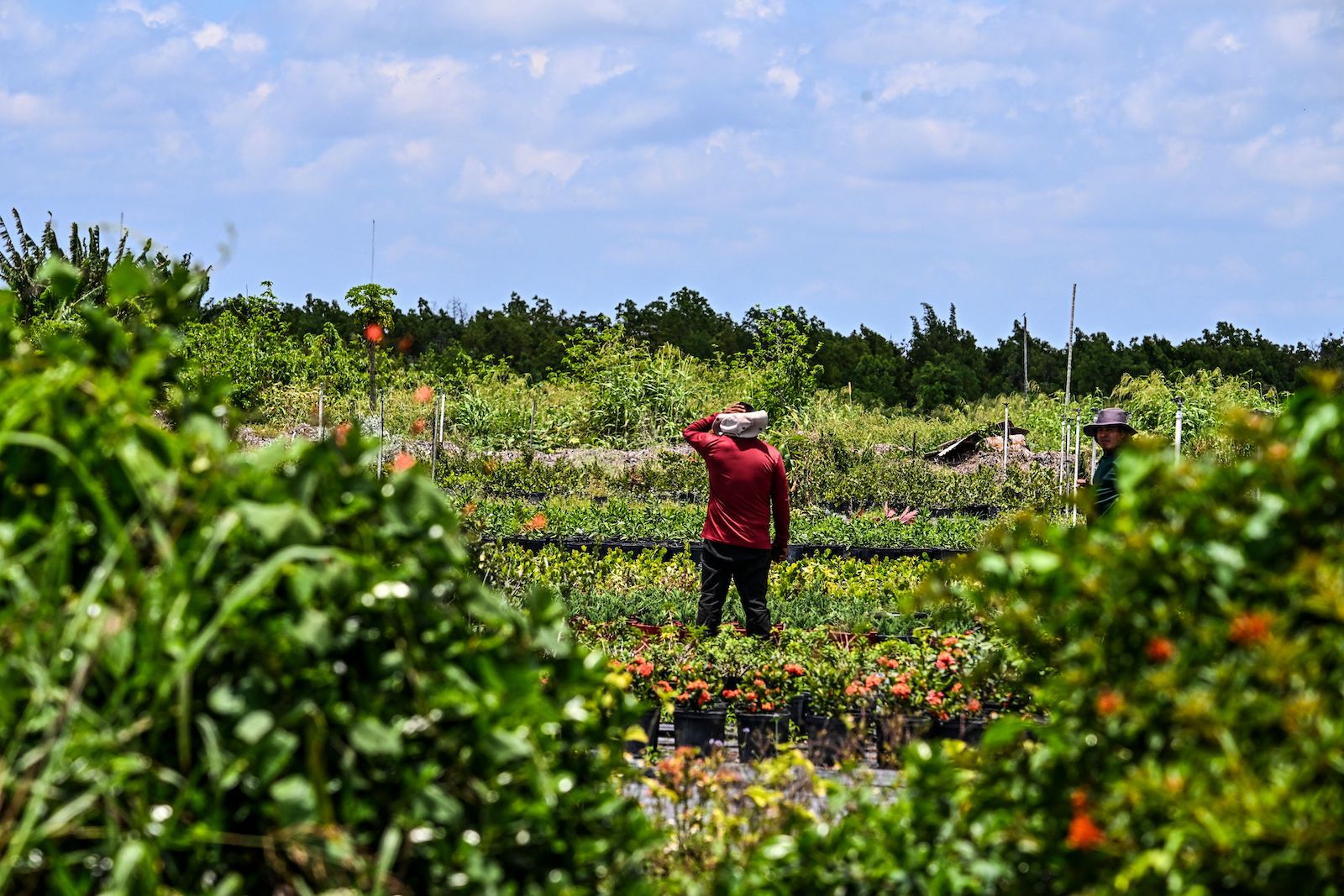
Historically, hunger rates among farmworkers, as with other low-income communities, have been at their worst during the winter due to the inherent seasonality of a job that revolves around growing seasons. But climate change and inflation have made food insecurity a growing, year-round problem.
In September, torrential rain caused heavy flooding across western Massachusetts. The inundation decimated farmland already ravaged by a series of storms. “It impacted people’s ability to make money and then be able to support their families,” Claudia Rosales said in Spanish. “People do not have access to basic food.”
As executive director of the Pioneer Valley Workers Center, Rosales fights to expand protections for farmworkers, a community she knows intimately. After immigrating from El Salvador, she spent six years working in vegetable farms, flower nurseries, and tobacco fields across Connecticut and Massachusetts, and knows what it’s like to experience food insecurity. She also understands how other exploitative conditions, such as a lack of protective gear or accessible bathrooms, can add to the stress of simply trying to feed a family. Rosales remembers how, when her kids got sick, she was afraid she’d get fired if she took them to the doctor instead of going to work. (Employers harassed her and threatened to deport her if she tried to do anything about it, she said.) The need to put food on the table left her feeling like she had no choice but to tolerate the abuse.
“I know what it’s like, how much my people suffer,” said Rosales. “We’re not recognized as essential … but without us, there would not be food on the tables across this country.”
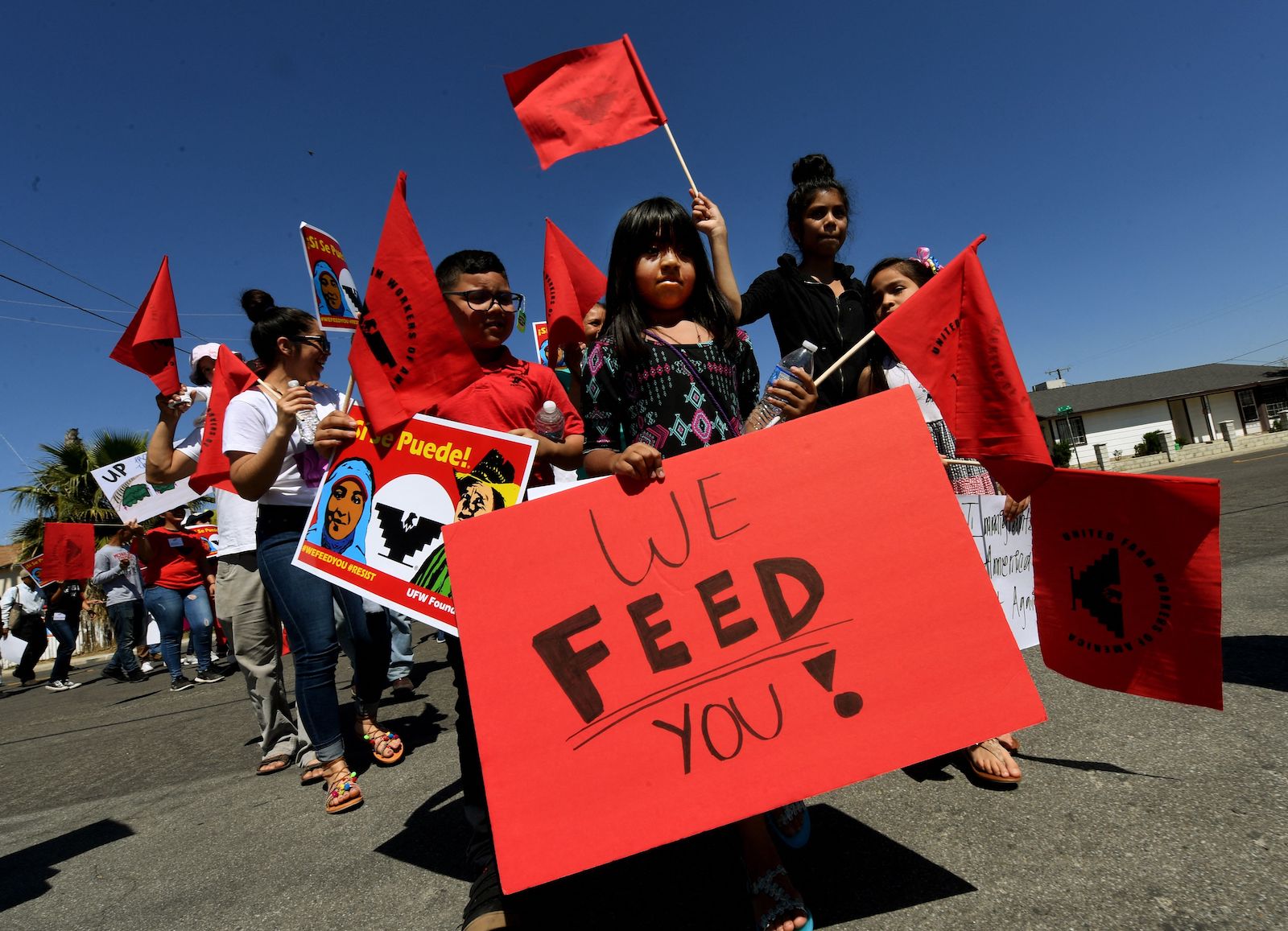
The floodwaters have long since receded and many farms are once again producing crops, but labor advocates like Rosales say the region’s farmworkers still have not recovered. Federal and state disaster assistance helps those with damaged homes, businesses, or personal property, but does not typically support workers. Under federal law, if agricultural workers with a temporary visa lose their job when a flood or storm wipes out a harvest, they are owed up to 75 percent of the wages they were entitled to before the disaster, alongside other expenses. They aren’t always paid, however. “Last year, there were emergency funds because of the flooding here in Massachusetts that never actually made it to the pockets of workers,” Rosales said.
The heat wave that recently scorched parts of Massachusetts likely reduced worker productivity and is poised to trigger more crop loss, further limiting workers’ ability to make ends meet. “Climate-related events impact people economically, and so that then means limited access to food and being able to afford basic needs,” said Rosales, forcing workers to make difficult decisions on what they spend their money on — and what they don’t.
The impossible choice between buying food or paying other bills is something that social scientists have been studying for years. Research has shown, for example, that low-income families often buy less food during cold weather to keep the heat on. But climate change has given rise to a new area to examine: how extreme heat can trigger caloric and nutritional deficits. A 2023 study of 150 countries revealed that unusually hot weather can, within days, create higher risks of food insecurity by limiting the ability to earn enough money to pay for groceries.
It’s a trend Parker Gilkesson Davis, a senior policy analyst studying economic inequities at the nonprofit Center for Law and Social Policy, is seeing escalate nationwide, particularly as utility bills surge. “Families are definitely having to grapple with ‘What am I going to pay for?’” she said. “People, at the end of the month, are not eating as much, having makeshift meals, and not what we consider a full meal.” Federal programs like the Supplemental Nutrition Assistance Program, or SNAP, are designed to help at times like these. More than 41 million people nationwide rely on the monthly grocery stipends, which are based on income, family size, and some expenses. But one national survey of nearly 3,700 farmworkers found just 12.2 percent used SNAP. Many farmworkers and migrant workers do not qualify because of their immigration status, and those who do often hesitate to use the program out of fear that enrolling could jeopardize their status. Even workers with temporary legal status like a working visa, or those considered a “qualified immigrant,” typically must wait five years before they can begin receiving SNAP benefits. Just six states provide nutrition assistance to populations, like undocumented farmworkers, ineligible for the federal program.
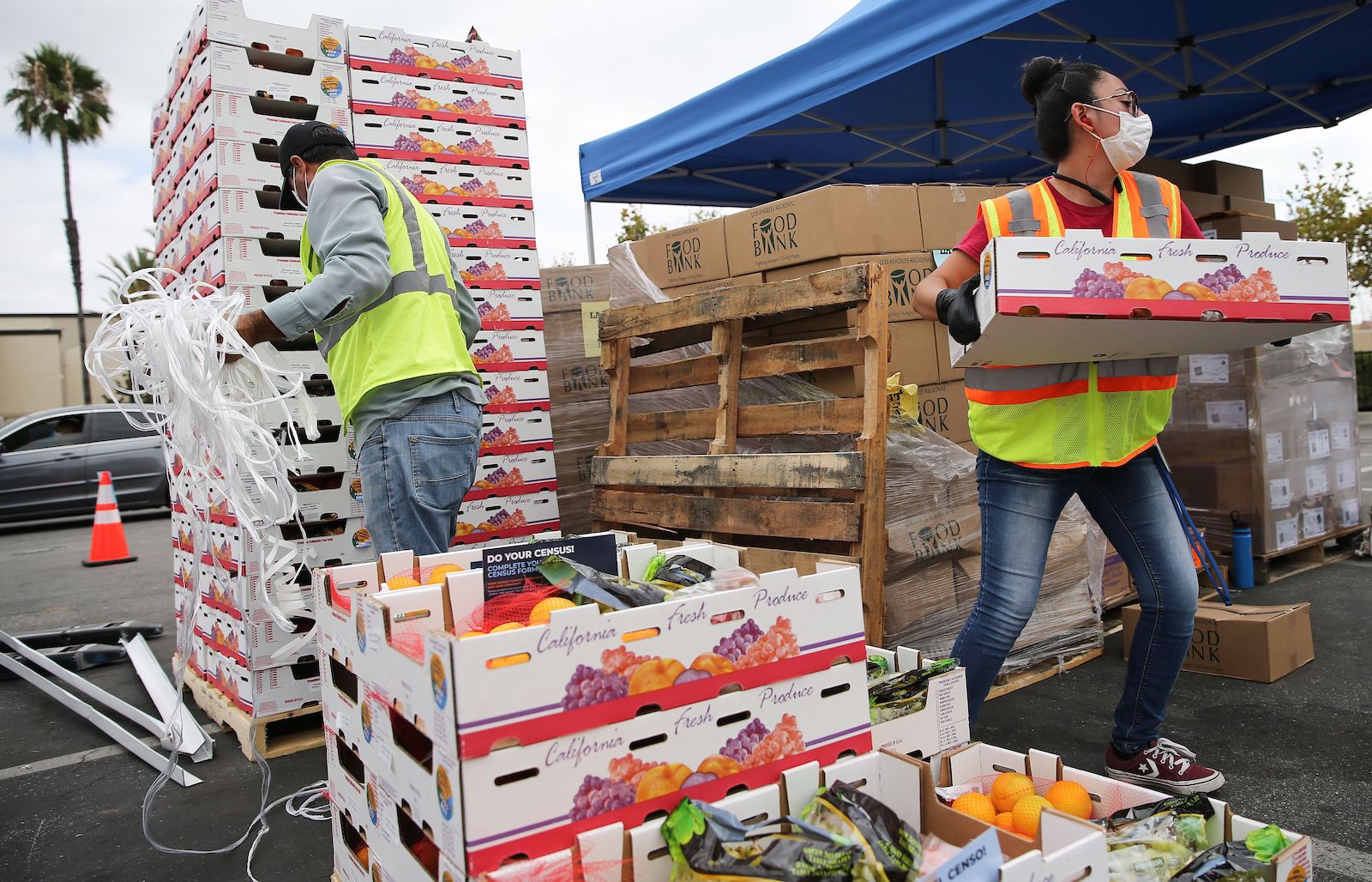
The expiration of COVID-era benefit programs, surging food costs, and international conflicts last year forced millions more Americans into a state of food insecurity, but no one can say just how many are farmworkers. That’s because such data is almost nonexistent — even though the Agriculture Department tracks annual national statistics on the issue. Lisa Ramirez, the director of the USDA’s Office of Partnerships and Public Engagement, acknowledged that the lack of data on hunger rates for farmworkers should be addressed on a federal level and said there is a “desire” to do something about it internally. But she didn’t clarify what specifically is being done. “We know that food insecurity is a problem,” said Ramirez, who is a former farmworker herself. “I wouldn’t be able to point to statistics directly, because I don’t have [that] data.”
Without that insight, little progress can be made to address the crisis, leaving the bulk of the problem to be tackled by labor and hunger relief organizations nationwide.
“My guess is it would be the lack of interest or will — sort of like a willful ignorance — to better understand and protect these populations,” said social scientist Miranda Carver Martin, who studies food justice and farmworkers at the University of Florida. “Part of it is just a lack of awareness on the part of the general public about the conditions that farmworkers are actually working in. And that correlates to a lack of existing interest or resources available to build an evidence base that reflects those concerns.”
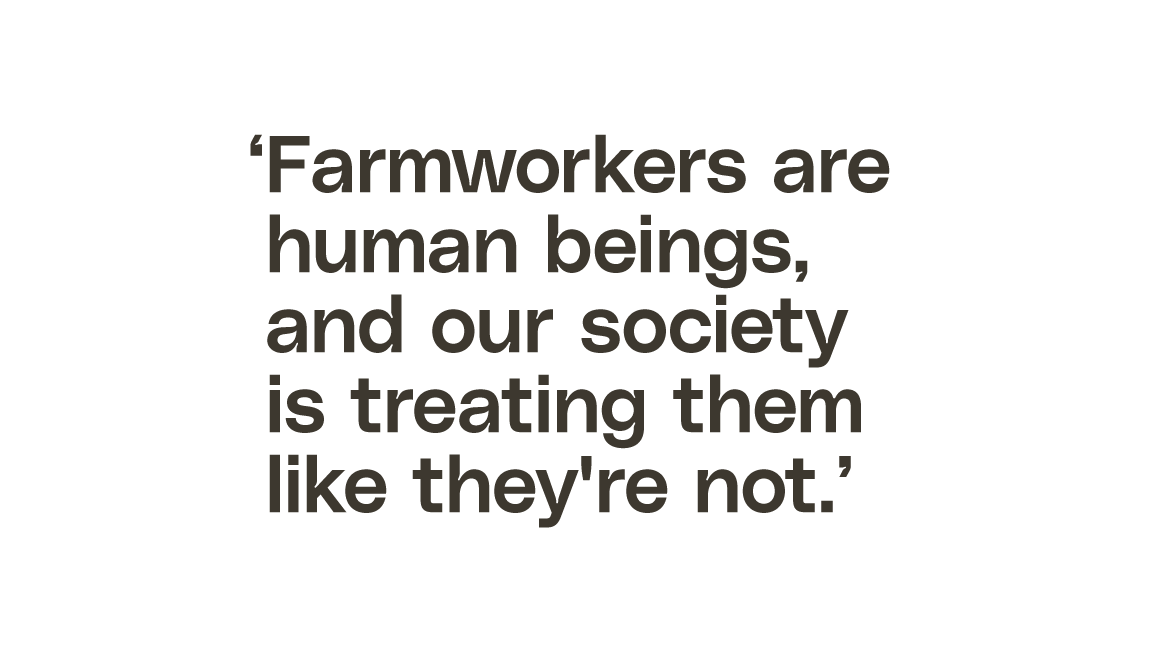
The lack of empirical information prevented Martin and her colleagues Amr Abd-Elrahman and Paul Monaghan from creating a tool that would identify the vulnerabilities local farmworkers experience before and after a disaster. “What we’ve found is that the tool that we dreamed of, that would sort of comprehensively provide all this data and mapping, is not feasible right now, given the dearth of data,” she noted.
However, Martin and her colleagues did find, in a forthcoming report she shared with Grist, that language barriers often keep farmworkers from getting aid after an extreme weather event. Examining the aftermath of Hurricane Idalia, they found cases of farmworkers in Florida trying, and failing, to get food at emergency stations because so many workers spoke Spanish and instructions were written only in English. She suspects the same impediments may hinder post-disaster hunger relief efforts nationwide.
Martin also believes there is too little focus on the issue, in part because some politicians demonize immigrants and the agriculture industry depends upon cheap labor. It is easier “to pretend that these populations don’t exist,” she said. “These inequities need to be addressed at the federal level. Farmworkers are human beings, and our society is treating them like they’re not.”

Tackling hunger has emerged as one of the biggest priorities for the Pioneer Valley Workers Center that Claudia Rosales leads. Her team feeds farmworker families in Massachusetts through La Despensa del Pueblo, a food pantry that distributes food to roughly 780 people each month.
The nonprofit launched the pantry in the winter of 2017. When the pandemic struck, it rapidly evolved from a makeshift food bank into a larger operation. But the program ran out of money last month when a key state grant expired, sharply curtailing the amount of food it can distribute. The growing need to feed people also has limited the organization’s ability to focus on its primary goal of community organizing. Rosales wants to see the food bank give way to a more entrepreneurial model that offers farmworkers greater autonomy.
“For the long term, I’d like to create our own network of cooperatives owned by immigrants, where people can go and grow and harvest their own food and products and really have access to producing their own food and then selling their food to folks within the network,” she said.
Mónica Ramírez, founder of the national advocacy organization Justice for Migrant Women, is developing something very much like that in Ohio. Ramírez herself hails from a farmworker family. “Both of my parents started working in the fields as children,” she said. “My dad was eight, my mom was five.” Growing up in rural Ohio, Ramírez remembers visiting the one-room shack her father lived in while picking cotton in Mississippi, and spending time with her grandparents who would “pile on a truck” each year and drive from Texas to Ohio to harvest tomatoes and cucumbers all summer.
The challenges the Ramírez family faced then persist for others today. Food security has grown so tenuous for farmworkers in Fremont, Ohio, where Justice for Migrant Women is based, that the organization has gone beyond collaborating with organizations like Feeding America to design its own hyperlocal food system. These hunger relief efforts are focused on women in the community, who Ramírez says usually face the biggest burdens when a household does not have enough money for food.
Migrant women, she said, “bear the stress of economic insecurity and food insecurity, because they are the ones who are organizing their families and making sure their families have food in the house.”
Later this month, Ramírez and her team will launch a pilot program out of their office that mimics a farmers market — one in which farmworkers and migrant workers will be encouraged to pick up food provided by a local farmer, at no charge. That allows those visiting the food bank to feel empowered by choice instead of being handed a box with preselected goods, and they hope it will alleviate hunger in a way that preserves a sense of agency for families in need.
Although federal lawmakers have begun at least considering protecting workers from heat exposure and regulators are making progress on a national heat standard, so far there’s been no targeted legislative or regulatory effort to address food insecurity among farmworkers.
In fact, legislators may be on the verge of making things worse.
In May, the Republican-controlled U.S. House of Representatives Agriculture Committee passed a draft farm bill that would gut SNAP and do little to promote food security. It also would bar state and local governments from adopting farmworker protection standards regulating agricultural production and pesticide use, echoing legislation Florida recently passed. The inclusion of such a provision is “disappointing,” said DeShawn Blanding, a senior Washington representative at the Union of Concerned Scientists, a nonprofit advocacy organization. He hopes to see the version that eventually emerges from the Democrat-controlled Senate, where it remains stalled, incorporate several other proposed bills aimed at protecting farmworkers and providing a measure of food security.
Those include the Voice for Farm Workers Act, which would shore up funding for several established farmworker support initiatives and expand resources for the Agriculture Department’s farmworker coordinator. This position was created to pinpoint challenges faced by farmworkers and connect them with federal resources, but it has not been “adequately funded and sustained,” according to a 2023 USDA Equity Commission report. Another bill would create an office within the Agriculture Department to act as a liaison to farm and food workers.
These bills, introduced by Democratic Senator Alex Padilla of California, would give lawmakers and policymakers greater visibility into the needs and experiences of farmworkers. But the greatest benefit could come from a third proposal Padilla reintroduced, the Fairness for Farm Workers Act. It would reform the 1938 law that governs the minimum wage and overtime policies for farmworkers while exempting them from labor protections.
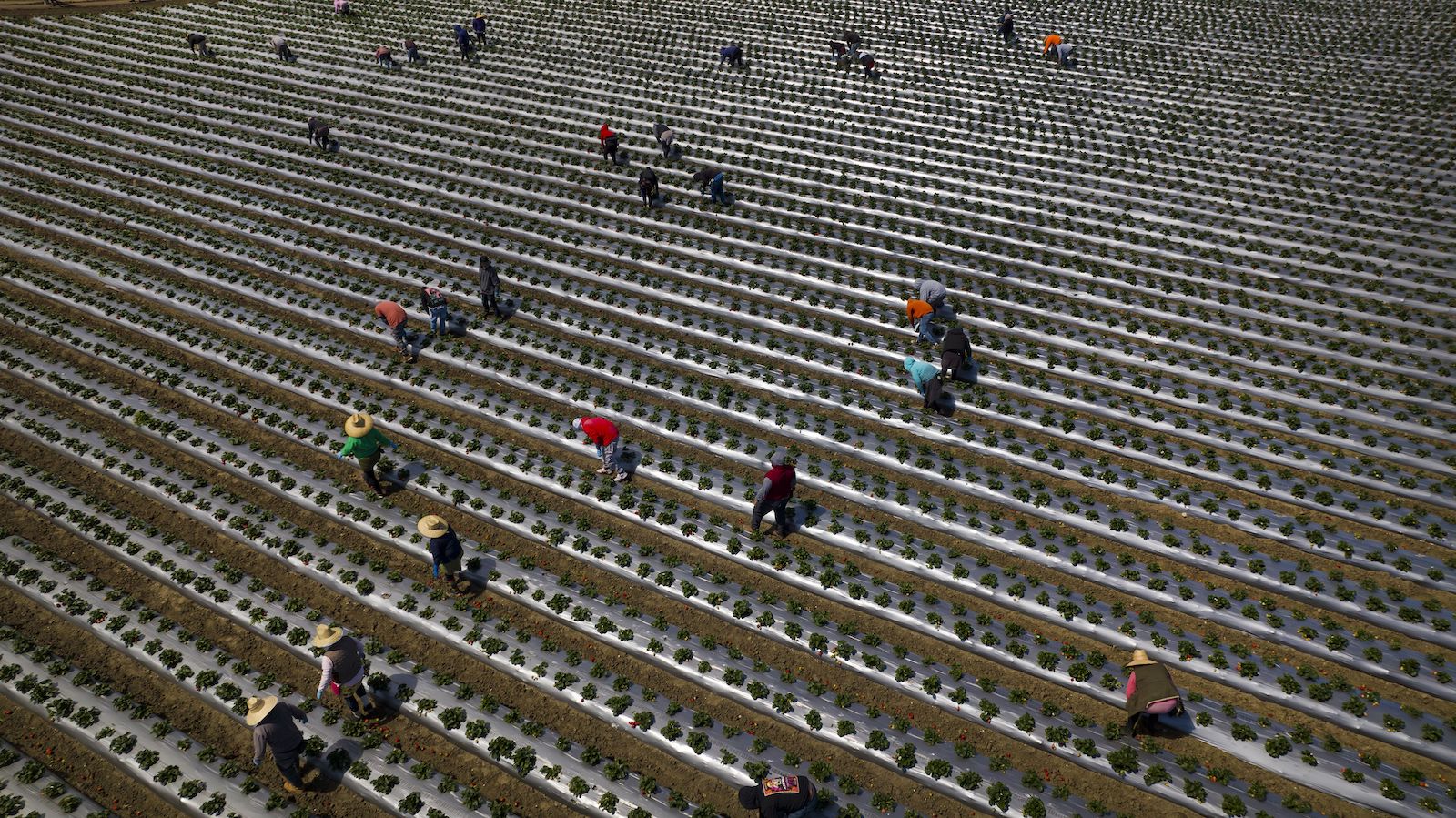
“As food prices increase, low-income workers are facing greater rates of food insecurity,” Padilla told Grist. “But roughly half of our nation’s farmworkers are undocumented and unable to access these benefits.” He’d like to see an expedited pathway to citizenship for the over 5 million essential workers, including farmworkers, who lack access to permanent legal status and social safety benefits. “More can be done to address rising food insecurity rates for farmworkers.”
Still, none of these bills squarely addresses farmworker hunger. Without a concerted approach, these efforts, though important, kind of miss the point, Mónica Ramírez said.
“I just don’t think there’s been a fine point on this issue with food and farmworkers,” she said. “To me it’s kind of ironic. You would think that would be a starting point. What will it take to make sure that the people who are feeding us, who literally sustain us, are not themselves starving?”
For 68-year-old Jesús Morales, the Campesinos’ Garden in Apopka is a second home. Drawing on his background studying alternative medicine in Jalisco, Mexico, he’s been helping tend the land for the last three years. He particularly likes growing and harvesting moringa, which is used in Mexico to treat a range of ailments. Regular visitors know him as the “plant doctor.”
“Look around. This is the gift of God,” Morales said in Spanish. “This is a meadow of hospitals, a meadow of medicines. Everything that God has given us for our health and well-being and for our happiness is here, and that’s the most important thing that we have here.”
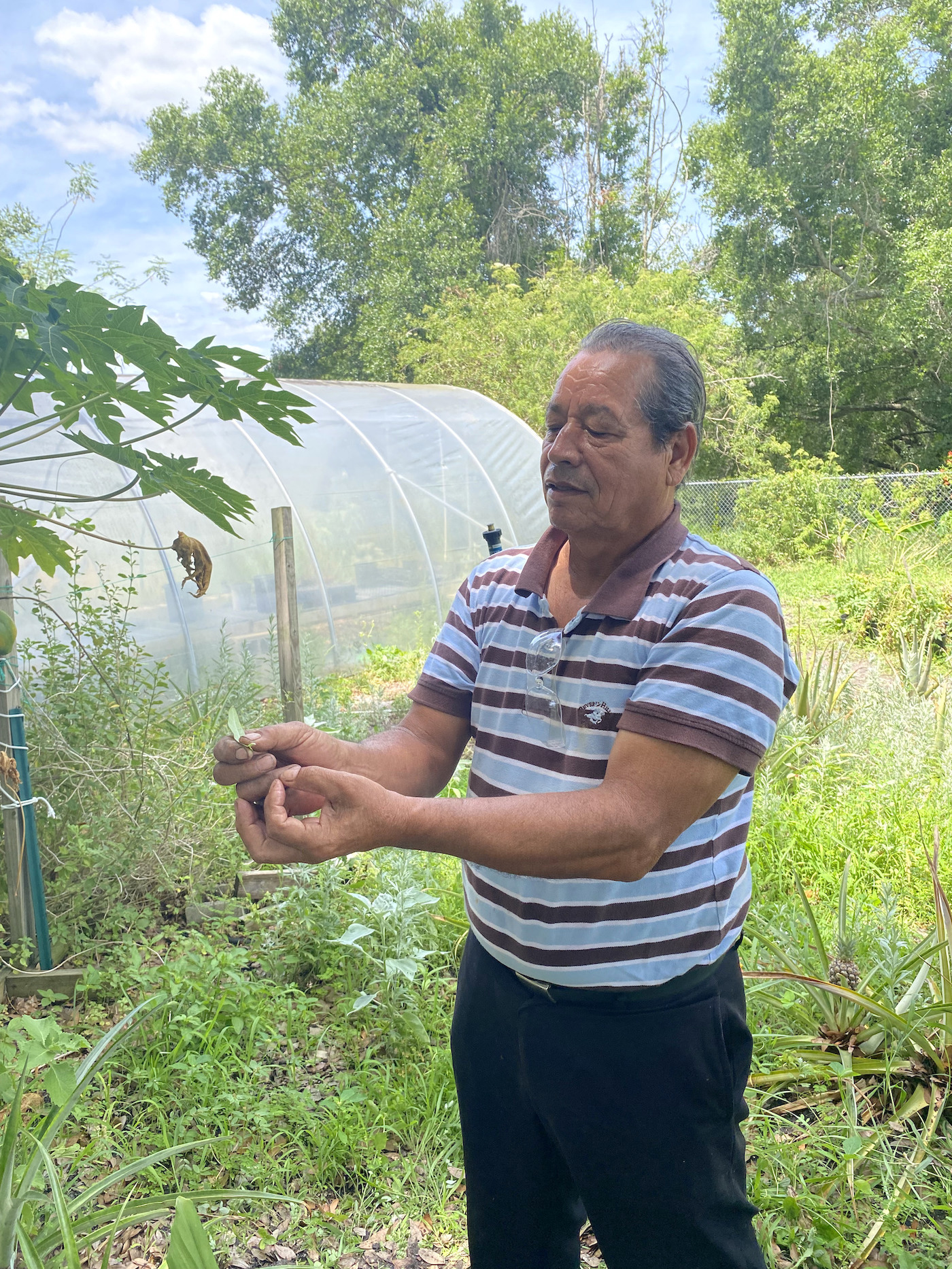
He came across the headquarters of the state farmworker organization when it hosted free English classes, then learned about its garden. Although it started a decade ago, its purpose has expanded over the years to become a source of food security and sovereignty for local farmworkers.
The half-acre garden teems with a staggering assortment of produce. Tomatoes, lemons, jalapeños. Nearby trees offer dragonfruit and limes, and there’s even a smattering of papaya plants. The air is thick with the smell of freshly dug soil and hints of herbs like mint and rosemary. Two compost piles sit side by side, and a greenhouse bursts with still more produce. Anyone who visits during bi-monthly public gardening days is encouraged to plant their own seeds and take home anything they care to harvest.
“The people who come to our community garden, they take buckets with them when they can,” said Ernesto Ruiz, a research coordinator at the Farmworker Association of Florida who oversees the garden. “These are families with six kids, and they work poverty wages. … They love working the land and they love being out there, but food is a huge incentive for them, too.”
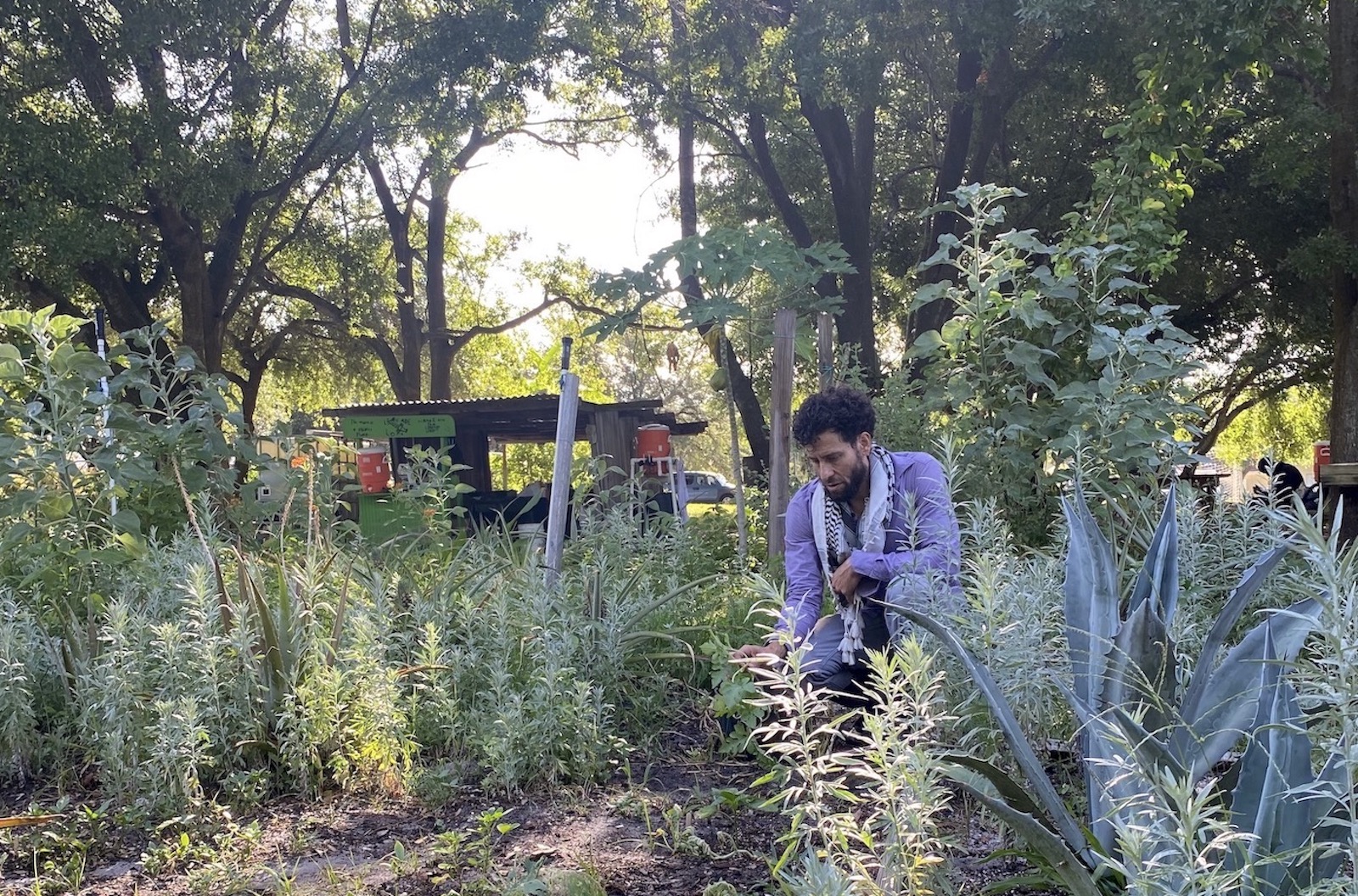
Throughout the week, the nonprofit distributes what Ruiz harvests. The produce it so readily shares is supplemented by regular donations from local supermarkets, which Ruiz often distributes himself.
But some of the same factors driving farmworkers to hunger have begun to encroach on the garden. Blistering summer heat and earlier, warmer springs have wiped out crops, including several plots of tomatoes, peppers, and cantaloupes. “A lot of plants are dying because it’s so hot, and we’re not getting rains,” said Ruiz. The garden could also use new equipment — the irrigation system is manual while the weed whacker is third-rate, often swapped out for a machete — and funding to hire another person to help Ruiz increase the amount of food grown and expand when the garden is open to the public.
Demand is rising, and with it, pressure to deliver. Federal legislation addressing the low wages that lead to hunger for many farmworkers across the country is a big part of the solution, but so are community-based initiatives like the Campesinos’ Garden, according to Ruiz. “You do the right thing because it’s the right thing to do,” he said. “It’s always the right thing to feed somebody. Always.”
This story was originally published by Grist with the headline The people who feed America are going hungry on Jul 17, 2024.
This content originally appeared on Grist and was authored by Ayurella Horn-Muller.
This post was originally published on Radio Free.
This content originally appeared on VICE News and was authored by VICE News.
This post was originally published on Radio Free.
This content originally appeared on Democracy Now! and was authored by Democracy Now!.
This post was originally published on Radio Free.

We feature a special broadcast marking the Juneteenth federal holiday that commemorates the day in 1865 when enslaved people in Galveston, Texas, learned of their freedom more than two years after the Emancipation Proclamation. We begin with our 2021 interview with historian Clint Smith, originally aired a day after President Biden signed legislation to make Juneteenth the first new federal holiday since Dr. Martin Luther King Jr. Day. Smith is the author of How the Word Is Passed: A Reckoning with the History of Slavery Across America. “When I think of Juneteenth, part of what I think about is the both/andedness of it,” Smith says, “that it is this moment in which we mourn the fact that freedom was kept from hundreds of thousands of enslaved people for years and for months after it had been attained by them, and then, at the same time, celebrating the end of one of the most egregious things that this country has ever done.” Smith says he recognizes the federal holiday marking Juneteenth as a symbol, “but it is clearly not enough.”
This content originally appeared on Democracy Now! and was authored by Democracy Now!.
This post was originally published on Radio Free.
This content originally appeared on AlternativeRadio and was authored by info@alternativeradio.org.
This post was originally published on Radio Free.
Dakar, 26 April 2024– The Burkinabe authorities should immediately lift the suspension of BBC Africa and Voice of America, and reverse the directive seeking to control local outlets’ coverage, said the Committee to Protect Journalists on Friday.
On Thursday, the Superior Council of Communication (CSC), Burkina Faso’s media regulator, suspended the British government-funded BBC Afrique and U.S. Congress-funded Voice of America from broadcasting for two weeks, according to a CSC statement and news reports. The CSC said the suspensions were “precautionary measures” in response to the outlets’ reporting on allegations of misconduct by the Burkinabe army, detailed in a report by the global Human Rights Watch (HRW) rights group.
The CSC also ordered internet service providers to block access to the BBC Africa and Voice of America’s websites, and asked Burkinabe media not to relay the content of the Human Rights Watch report under penalty of “sanctions provided for by the laws in force.”
“The Burkinabe authorities must immediately lift the suspension of BBC Africa and Voice of America and refrain from censoring local journalists and media outlets,” said Angela Quintal, head of CPJ’s Africa program, in New York. “The army’s conduct cannot be a taboo subject. Burkinabe citizens have the right to be informed on all matters of public interest in the military response to the security crisis in their country.”
According to the HRW report, the Burkinabe army had killed 223 civilians in the country’s north in retaliation for attacks by armed Islamist fighters. In its statement, the CSC said the Voice of America and BBC Africa broadcasts constituted “disinformation likely to discredit the Burkinabe army.”
In an April 26 statement, Voice of America said that it “stands by its reporting” and “intends to continue to fully and fairly cover activities in the country.” A BBC spokesperson told CPJ that “the suspension reduces BBC’s ability to reach audiences with independent and accurate news” and it will continue to report on the region in the public interest and without fear or favor.
Burkina Faso is ruled by a military regime led by Ibrahim Traoré, who seized power during a September 2022 coup amid an insurgency by Islamist armed groups.
Previously, Burkinabe authorities suspended several international media outlets for reporting on military misconduct allegations and in November sought to conscript two journalists into the military.
Reached via a messaging application, Blahima Traoré, CSC’s general secretary referred CPJ to the CSC’s decision and did not elaborate further.
This content originally appeared on Committee to Protect Journalists and was authored by Committee to Protect Journalists.
This post was originally published on Radio Free.
This post was originally published on IndigenousX.
New York, April 8, 2024 – The Committee to Protect Journalists is alarmed by reports that the Taliban plans to restrict or block access to Facebook in Afghanistan and calls on authorities not to move ahead on a measure that would further impede the free flow of information in the country.
On April 6, Najibullah Haqqani, the Taliban’s acting Minister of Telecommunications and Information Technology, announced in an interview with the independent, Kabul-based TOLOnews TV station that the group has finalized a plan to restrict or completely block access to Facebook in Afghanistan.
Since the Taliban regained control of Afghanistan in August 2021, the group has detained journalists, shut down Afghan news websites, and restricted access to foreign media outlets.
The Facebook pages for foreign news outlets that have been banned in Afghanistan—such as the U.S. Congress-funded broadcasters Voice of America and RFE/RL, the British public broadcaster the BBC, and the German public broadcaster Deutsche Welle—however, are still accessible to readers inside the country.
“The Taliban’s plan to restrict or block access to Facebook would be a further blow to freedom of information in Afghanistan,” said Beh Lih Yi, CPJ’s Asia program coordinator. “Social media platforms, including Facebook, have helped to fill a void left by the decline of the Afghan media industry since the Taliban’s August 2021 takeover and the ensuing crackdown on press freedom. The proposed ban highlights the worsening censorship by the Taliban.”
Facebook is one of the most popular social media platforms widely used by media outlets to disseminate news and information in Afghanistan, including TOLOnews, which has over 4.5 million followers on Facebook.
When contacted, Taliban spokesperson Zabiullah Mujahid told CPJ via messaging app that “Facebook will not be banned but restrictions will be imposed on it.”
This content originally appeared on Committee to Protect Journalists and was authored by Committee to Protect Journalists.
This post was originally published on Radio Free.